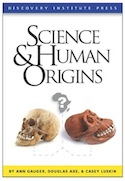 Intelligent Design
Intelligent Design
When You Can’t Answer the Argument, Attack the Credentials of the Person Offering It
Some critics of Science and Human Origins charge that the authors have no business writing about the subject because they aren’t paleoanthropologists. One anonymous critic posted on Amazon that because Ann Gauger, Doug Axe and Casey Luskin have degrees in the wrong fields, they can be safely ignored. What a relief that must be for Darwin defenders!
Three ID creationists, none of whom have a background EVEN REMOTELY related to physical anthropology, purport to write a book on “Science and Human Origins,” published by their own execrable propaganda mill, the notoriously dishonest Disco ‘Tute. Why should anybody not a drunk-the-koolaid devotee of fundamentalist wingnut pseudoscience care?
Of course, this critic started his discussion thread before the book was even released, so obviously he didn’t read it. Oh well, we’ve come to expect these kinds of attacks on books and authors that challenge Darwinist orthodoxy. Still it’s worth using this example — outlandish though it is — as an occasion to respond to the objection.
 First, if the critic had read Science and Human Origins, he would have learned that there’s a lot more in it than just physical anthropology. In fact, three or four of the book’s five chapters arguably aren’t about physical anthropology or paleoanthropology at all — they’re about molecular biology and genetics. And two of the three authors of those chapters — Gauger and Axe — are biologists with strong backgrounds in those subfields.
First, if the critic had read Science and Human Origins, he would have learned that there’s a lot more in it than just physical anthropology. In fact, three or four of the book’s five chapters arguably aren’t about physical anthropology or paleoanthropology at all — they’re about molecular biology and genetics. And two of the three authors of those chapters — Gauger and Axe — are biologists with strong backgrounds in those subfields.
So as far as the subject matter of the book is concerned, they have scientific training in precisely the topics they’re writing about.
For example, in Chapter 2, Doug Axe writes about the ability of the mutation-selection mechanism to produce, in humans, features that require multiple coordinated mutations. Since Axe has published peer-reviewed research on the evolution of multimutation features as well as experimental research showing that these features exist in nature, he’s well suited to address the subject here. His chapter argues that it would be mathematically impossible for multimutation features to arise by mutation and selection in humans in the six million years since their most recent alleged common ancestor with apes.
Likewise, in Chapter 5, Ann Gauger addresses a specific subfield of biology called population genetics. Dr. Gauger has a strong background in molecular biology, genetics, cell biology, and developmental biology, having studied at MIT as an undergrad, the University of Washington for her PhD, and as a post-doc fellow at Harvard. As credentials go, those are not bad.
As for other parts of the book, Casey Luskin wrote Chapter 3, which is the chapter that by far deals the most with paleoanthropology. Luskin holds two degrees in earth sciences from UC San Diego, took many courses covering evolution — including courses studying fossils relevant to human origins — during undergraduate and graduate studies, and conducted geological research at Scripps Institution for Oceanography. While it’s true that Luskin doesn’t hold a formal degree in paleoanthropology, he’s scientifically trained in closely related fields. A few years back he published a technical paper titled “Human Origins and Intelligent Design: Review and Analysis” in the ID journal Progress in Complexity, Information, and Design.
Luskin is an informed outsider and perfectly well suited to consider the evidence, bringing a fresh perspective and drawing a credible conclusion. Trained as an attorney, he does a fine job of spotting logical problems in the evolutionist’s case for human/ape common ancestry. Casey’s chapter on the fossil record is the longest in the book, with well over 100 citations to mainstream technical scientific articles and books related to human origins. Critics need to respond to his discussion of the evidence.
Will they? If past experience is a guide, there’s reason to doubt it. Critics of intelligent design are more comfortable attacking people than they are answering arguments. So it goes with the community of Darwin boosters. Their ranks are heavy with bullies and their leaders are almost all cowards, who flee from a fair fight on the merit of the ideas that are up for debate.
